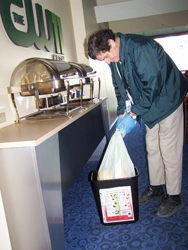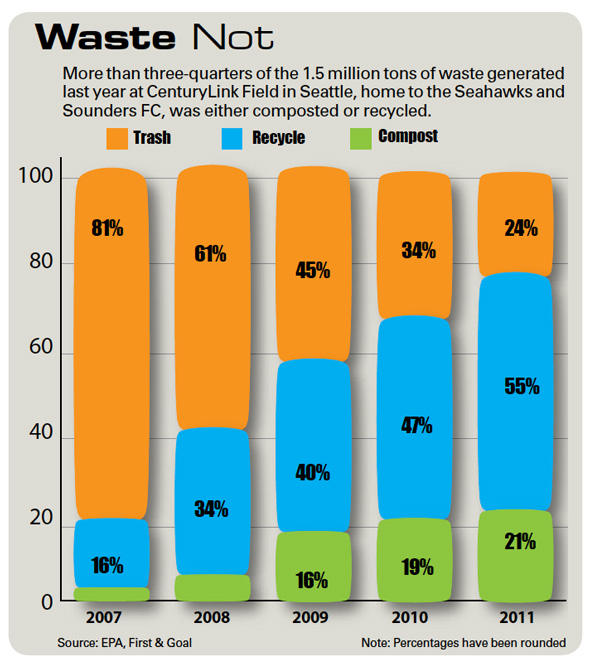Concessionaires and teams at every major league venue have in recent years instituted programs to reduce their waste, ranging from placing recycling cans next to trash cans in public areas to using compostable plates, cups, cup carriers and straws.
Now with a few years of data under their belts, they can see the financial benefits that have complemented what was likely an initial nice public relations glow, and tackle the primary source of that waste.
“Food is now the No. 1 material sent to landfills each year,” the EPA’s Jean Schwab told the Stadium Managers Association this year at that group’s annual conference.
 |
As part of composting efforts, a worker at CenturyLink Field gathers food waste from a suite.
Photo by: Seattle Seahawks / Sounders |
Schwab oversees the EPA’s National Food Recovery Initiative, which has established a food recovery partnership with the SMA, NHL and several teams. Schwab pointed out that more often than not, the facility owner — not the concessionaire — is on the hook for the disposal costs.
The most effective way of reducing food waste, according to a Food Recovery Pyramid designed by the EPA, is (logically) to prepare less food. However, concessionaires and their team partners universally agree that this approach comes with a major risk that may outweigh the benefits: running out of food during a game. And with the margins so high on more popular concession items such as hot dogs, kitchens are willing to overprepare.
However, teams have found that after they have conducted an audit — either independently or by using the EPA’s online tools — and created a benchmark of food waste, solutions become more clear.
For example, donating leftover game-day food has been standard practice for years for a number of teams. However, local laws and transportation issues have often provided hurdles that can discourage the practice. Concessionaires universally praise the 2008 Federal Food Donation Act, an extension of the 1996 Bill Emerson Good Samaritan Food Donation Act, a federal law designed to encourage businesses to donate leftover food to nonprofit groups, without fear of civil or criminal liability.
As a direct result of that legislation, the NHL and its 30 clubs since 2010 have teamed up with Rock and Wrap It Up!, a New York-based agency that matches teams with local groups that provide food to the needy. The organization, which also works with about two dozen stadiums, vets groups in a team’s market that can handle pickup in a refrigerated truck and handle storage on-site. At the end of each game, unserved, wrapped edible foods are frozen, then picked up by nonprofit groups at no cost to the concessionaire or the team.
TD Garden, for example, has donated an average of 15.5 tons of food per season the past three seasons to the Boston Rescue Mission through Rock and Wrap It Up!
As part of its partnership with Rock and Wrap It Up!, the NHL’s 30 clubs have combined to donate more than 205,000 pounds of food in each of the last two seasons to local food banks.
The NHL is monitoring not just game-day donations of each club, but expects that in a few months every team will make its individual environmental and energy use data available to every other club.
“Our goal is to have a metrics system fully operational with accurate reporting before next season,” said Paul LaCaruba, who handles the NHL’s sustainability initiatives. He said about 10 of the league’s clubs now use an online spreadsheet template set up by the league to enter game-day donation, recycling, composting and landfill data.
Delaware North Sportservice also will roll out a company-wide software platform this year, intended to have all of its business units — not just its sports venues — share data and best practices. The company last year created the office of environmental affairs and sustainability and tabbed Anne Marie McManus to head the process. McManus is an environmental engineer who has spent nearly three decades in the field.
“Environmental affairs are today’s issues, and sustainability deals with tomorrow’s,” McManus said. “My job this year is to help reduce sustainability barriers our business units face by setting up infrastructure like corporate-wide purchasing, sharing best practices and developing national contracts for waste disposal.”
Although Sportservice saw a 22 percent increase in the number of events at Cleveland’s Progressive Field from 2007-11, the 682 tons of waste that were hauled from the ballpark to the landfill last year was down 46 percent over 2007.
Brad Mohr, the Cleveland Indians’ assistant director of ballpark operations, said the team saved more than $250,000 in total waste disposal costs from 2008-11 as a result of operational and attitudinal changes.
In 2009, a local company that provides biofuel to a truck fleet began going to the ballpark regularly to collect 10 to 11 tons of used cooking oil annually. After a year of collecting the oil in buckets, Sportservice paid for new pumping equipment, and now the only costs involved belong to the company picking up the oil.
In 2010, the Indians worked with a local composting company to start a coalition of downtown businesses, including the Browns and Cavaliers, to put together a route for trucks to haul away compostable waste. The Indians’ six-game test run at the end of that season generated five tons of compost. More than 20 tons were generated after the program was fully implemented last year.
Mohr said that last year the garbage man came 99 times to Progressive Field, down from 254 “pulls” in 2007. Each visit costs an average of $550, compared with the $7 it costs to pick up each compost tote. And he said that 2011 was the first year that the average visitor generated less than one pound of landfill-bound trash.
Once Sportservice and the Indians began auditing what was being thrown away, they were able to better manage inventory. As a result, three tons of food were donated from Progressive Field to area food banks last year, down from six tons in 2010.
CenturyLink Field, home to the Seattle Seahawks and Seattle Sounders FC, was selected in 2006 to participate in a pilot program through the EPA WasteWise Partnership program monitoring its food waste disposal. After benchmarking its numbers with stadium concessionaire Levy, longtime partners Anheuser-Busch and Coca-Cola joined the effort, and last year only one quarter of the waste produced at the stadium went to the dump (see chart).
Petco Park, home of the San Diego Padres, composted 60 tons, or 36 percent, of its food waste in 2005, saving nearly $6,000 in disposal costs. The team last year diverted 56 percent of its waste, or approximately 165 tons, away from landfills. The average annual savings in trash removal over that seven-year stretch was nearly $11,000. The club also gives away an average of 20 tons of cooking oil for use as biofuel.
While most clubs are still in the early stages of tracking the financial benefits of reducing their volume of waste, some in the industry are already looking ahead to the next phase. Venue-generated compost can be repurposed on-site as mulch and fertilizer. Cooking oil can be converted on-site to power vehicles and other equipment. Such efforts would not only further reduce haul-away costs, but reduce the venues’ carbon footprint.






